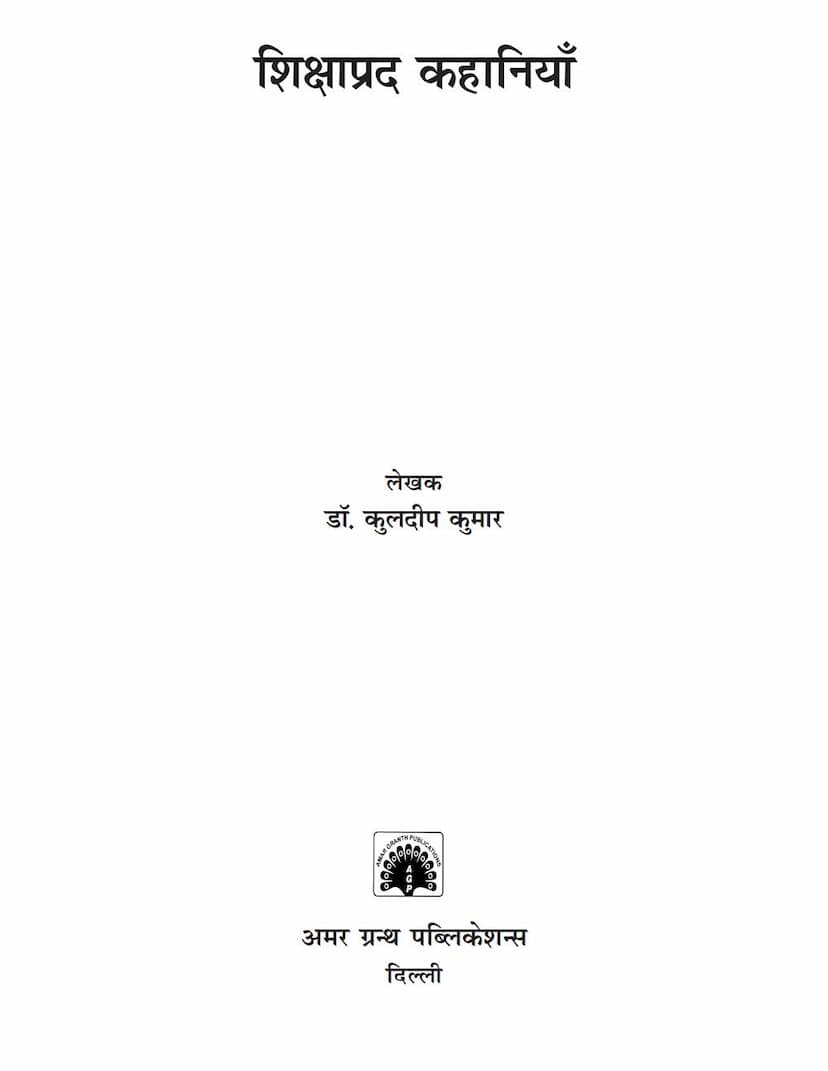Shikshaprad Kahaniya
Added to library: September 2, 2025

Summary
Certainly, here is a comprehensive summary of the Jain text "Shikshaprad Kahaniya" (Educational Stories) by Dr. Kuldeepkumar, published by Amar Granth Publications:
Book Title: Shikshaprad Kahaniya (शिक्षाप्रद कहानियाँ) Author: Dr. Kuldeepkumar Publisher: Amar Granth Publications, Delhi Catalog Link: https://jainqq.org/explore/034003/1
Overall Summary:
"Shikshaprad Kahaniya" is a collection of approximately 100 inspiring stories compiled by Dr. Kuldeepkumar. These stories, drawn from ancient traditions, aim to impart valuable life lessons and moral principles to readers. The book is presented as a medium for education and self-improvement, emphasizing the power of storytelling to transform lives.
Key Themes and Content:
The book is structured into numerous short stories, each focusing on a specific virtue, ethical principle, or life lesson. The preface, written by Prof. Virsagar Jain, highlights the importance and effectiveness of stories as a teaching tool, capable of changing hearts and minds. He emphasizes that well-crafted stories require great scholarship and skill in narration.
Dr. Kuldeepkumar, in his personal anecdote, shares how his life was transformed by the stories narrated by his Guru, Prof. Virsagar Jain. He explains that stories have been a powerful method of knowledge acquisition since ancient times, citing Panchatantra as an example. He hopes that reading these stories will help at least one person live a more meaningful life.
The table of contents reveals a wide array of themes covered in the stories, including:
- Importance of Helping Others: Stories like "Sahayata hi Dharm Hai" (Help is Religion) and "Paupakar hi Jeevan Hai" (Altruism is Life) stress the virtue of selfless assistance to fellow beings.
- Duty and Morality: Themes like "Sabse Bada Kartavya Paupakar" (The Greatest Duty is Altruism), "Satya ka Bal" (The Strength of Truth), and "Nishirdhniya Vastra" (Unnecessary Clothing - possibly implying vanity or attachment) explore moral responsibilities.
- Personal Virtues: The collection emphasizes cultivating good qualities through stories such as "Gungrahi Banna Chahiye" (One Should Appreciate Virtues), "Santosh hi Sukh ka Mool Hai" (Contentment is the Root of Happiness), and "Sacchai Bhalai" (True Goodness).
- Consequences of Negative Traits: Stories address the pitfalls of vices like greed ("Lalach Buri Bala Hai" - Greed is a Great Evil), envy ("Dwesh Nahi Karna Chahiye" - One Should Not Harbor Ill Will), anger, pride, and ignorance.
- Wisdom and Understanding: Several stories focus on gaining knowledge and understanding, like "Khud ko Jano" (Know Thyself), "Budhhi ka Kamal" (The Miracle of Intellect), and "Anubhav Jaruri" (Experience is Necessary).
- The Power of Unity and Teamwork: The story "Ekta mein Bal Hai" (There is Strength in Unity) illustrates the benefits of working together.
- The Nature of Reality and Spirituality: Stories delve into spiritual concepts such as "Swarg aur Nark" (Heaven and Hell), "Bhagwan Kahan Hain?" (Where is God?), and "Atmanveshan" (Self-Inquiry).
- Practical Life Lessons: The book also includes practical advice on various aspects of life, such as "Jaise ko Taisa" (Tit for Tat), "Apne Vicharon ko Samjho" (Understand Your Thoughts), and "Man ki Suno, Par Karo Apne Mann Ki" (Listen to Everyone, But Do What Your Mind Says).
Structure and Style:
Each story is relatively short and uses simple language, making them accessible to a broad audience, particularly younger readers or those new to Jain philosophy. The narratives are engaging and often use analogies and allegories to convey complex moral and spiritual ideas. The inclusion of Sanskrit shlokas (verses) at the beginning of some stories adds depth and traditional weight to the lessons.
Target Audience and Purpose:
The book is primarily intended for educational purposes, aiming to instill moral values and provide guidance for a righteous life. It serves as a resource for personal development, encouraging readers to reflect on their actions and cultivate positive attributes. The stories are presented to foster ethical understanding, spiritual growth, and a better way of living, aligning with Jain principles of compassion, truthfulness, non-violence, and self-control.